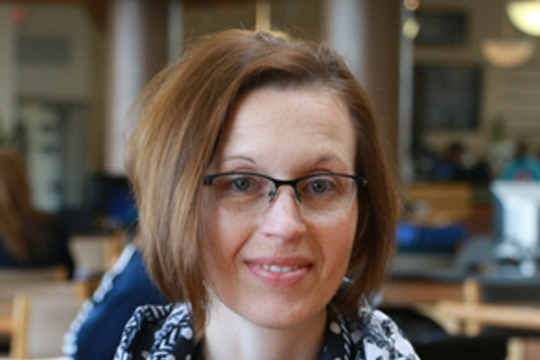 Stephanie Carlson-Ballone
Stephanie Carlson-Ballone
“The hands and eyes are windows to the soul,” says Stephanie Carlson-Ballone, a member of the inaugural Doctor of Occupational Therapy (OTD) class that is graduating from Concordia University Wisconsin on May 13. “The way people use their hands reveals a lot about them.”
Stephanie Carlson-Ballone knows a thing or two about hands and upper extremity rehabilitation. As an occupational therapist with a specialty certification in hand rehabilitation, Stephanie is on a mission to help people with limited hand function adapt and adjust to fully live the lives they were meant to live.
Stephanie wanted to become an occupational therapist even before she obtained first-hand experience with how the profession positively impacts a person’s quality of life. Midway through her education journey, Stephanie was diagnosed with Syringomyelia (SM), a serious disorder in which a cyst forms within the spinal cord and dramatically affects the nerves in the upper extremities.
While she was pursuing her first degree at Concordia University, a master’s degree in occupational therapy, she had a craniotomy, a surgery that removed part of a bone in her skull to relieve the pressure caused by spinal fluid. She wanted to quit school to focus on recovery, but her professors, classmates, and, especially, her husband, Joe, encouraged her to keep going.
Her treatment and recovery included much upper extremity rehabilitation work.
While this part of her life was traumatic, it also helped her see the bigger picture.
“I realized that I didn’t have the control in my life that I thought,” said Stephanie. “I definitely deepened my faith through this experience.”
Stephanie is one of nine doctoral students at Concordia University who are completing their degree in this post-professional program. The program, offered primarily online, was designed for practicing occupational therapists who are interested in pursuing continued, specialty education.
The inaugural class was admitted to the upper extremity rehabilitation track and spent two years developing their clinical expertise, exploring evidence-based practice in occupational therapy and executing a capstone project based on their career goals.
Stephanie’s capstone project focused on the anatomy of the hand and resulted in a national, online webinar that helps educate therapists preparing for their specialty certification exam.
The nine doctoral students began their cohort together in 2014. Under the leadership of Dr. Rebecca Neiduski, chair and associate professor of OT at Concordia University, the online program enrolls employed therapists from all over the world. The shared experience of working full-time in the same profession and seeking further specialized education helped the classmates form a tight bond with each other and their professors, despite the fact that they rarely met face-to-face.
“Not everyone can work full-time and go to school full time,” explains Stephanie. “It definitely helped that others were going through the same thing. We pushed and encouraged each other.”
Stephanie and her husband, Joe, have traveled from their home in Marquette, Mich., to participate in the commencement ceremony at the University’s Mequon campus.
Joe has been alongside Stephanie throughout this entire journey.
“He has sacrificed so much for me to be here,” says Stephanie. “I wouldn’t have finished the program, or made it through recovery without his support.
Unsurprisingly, this journey, their journey, can best be summed up by looking at Stephanie’s hands. An infinity symbol is tattooed on the ring finger of her left hand in place of her wedding ring because nerve damage prevents her from wearing jewelry. This tattoo is a permanent symbol of their love, her condition, and her rehabilitation journey intertwined together on Stephanie’s hand.
The window to Stephanie’s soul is very revealing.
Note: This is one in a series of stories leading up to Concordia University Wisconsin’s spring graduation ceremonies.
— This story is written by Kali Thiel. Kali was Director of University Communications until April, 2025.
If this story has inspired you, why not explore how you can help further Concordia's mission through giving.